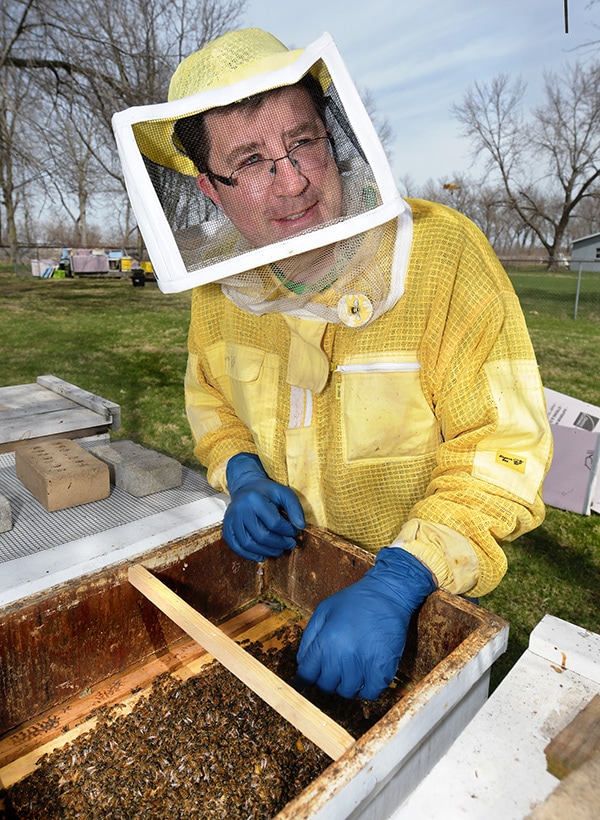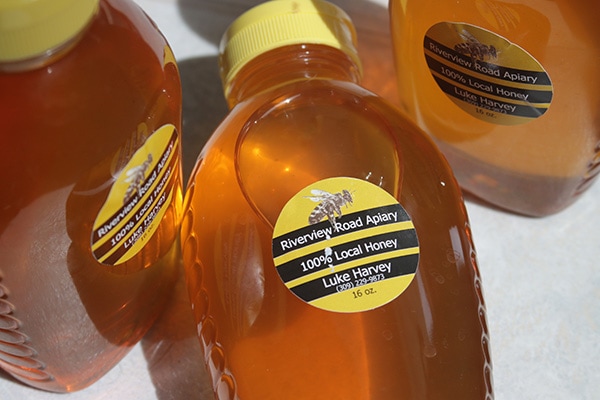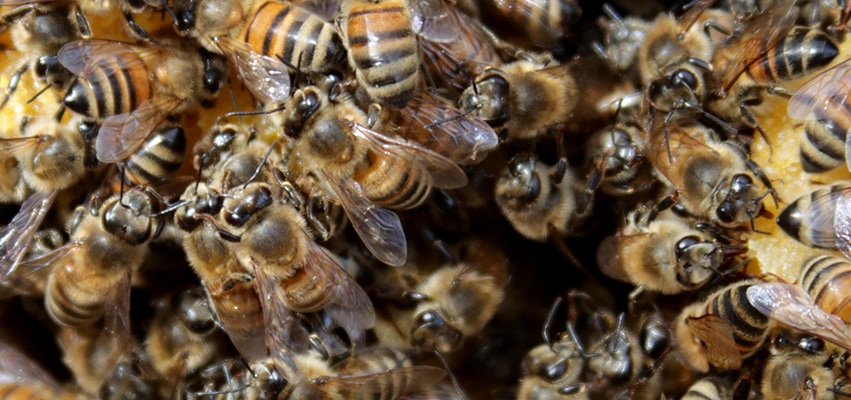About one-third of the food eaten in the U.S. comes from insect pollinated plants. Honey bees are responsible for 80 percent of that pollination, according to the U.S. Department of Agriculture. These amazing creatures also are the only insects that produce food eaten by man. With an average life span of just 42 days, the honey bee can accomplish a great deal in a very short time.

Luke Harvey, of Chillicothe, has been exploring the honey bee world for about nine years.
“I was stung with curiosity while visiting a friend who was keeping bees,” he recalled of his start. “Not knowing anything about them, I stood directly in front of the hive, in their flight path, which is the worst place … While standing there, a bee flew out of the hive and stung me in the neck. After nursing my wounded ego, I wanted to know more about how a bee knew I was standing out there, why they stung me, and generally more about these busy little insects.”
His research left him “hooked. I started with two hives and never looked back.”
Currently, Harvey has about 40 hives.
Because of the connection he’s developed with them, “I am more aware of what is happening in nature around me,” said Harvey. “It makes me better appreciate the change in seasons in Illinois and how beautiful the world we live in can be.”
Just like the weather, there are four seasons for a beekeeper.
Winter is for gathering information and getting equipment ready. As a hobbyist, this is the ideal time to start your preparations. Spring is busy making certain the bees have enough food until flowers start blooming and pollen is coming in. The bees also need enough space to grow as a hive. Summer is for growing your apiary, or group of hives, if that is what you want to do, and eventually taking the extra honey the hive produces. Finally, fall is about preparing the hives so they can make it through our relatively long winter.
During spring and summer, Harvey spends about 30 minutes per hive per week — approximately 20 hours — which is what he can reasonably manage with his full-time job.
As far as sustainability, Harvey says it depends on what kind of business you want. As a hobbyist, he found that he could almost break even if the honey flow was good. Making a business of beekeeping requires far more time and effort. As with any business, it’s important to define what your services will be, to determine what you are going to sell and where you can sell it.
Local honey is significantly different than what you often get in a store. Raw honey requires minimal processing and can be good for allergies. Honeycomb and cut comb also contain honey. Besides honey, consumers desire pollen, wax, royal jelly, start-up colonies, etc. Candles, bar lotions and hand creams can be made from the wax. Craftsmen use raw wax for various applications. Many people require new bees or queen bee replacements during the year.
 Riverview Road Apiary, Harvey’s business, is on Facebook, with his website at www.riverviewroadapiary.com. He also belongs to Heart of Illinois Beekeepers (www.hoibees.org), which offers support to new and experienced beekeepers alike through monthly programs and mentorship.
Riverview Road Apiary, Harvey’s business, is on Facebook, with his website at www.riverviewroadapiary.com. He also belongs to Heart of Illinois Beekeepers (www.hoibees.org), which offers support to new and experienced beekeepers alike through monthly programs and mentorship.
This year, he began offering classes to beginning beekeepers, to beekeepers who want to learn how to make their own queens through grafting, to nonbeekeepers who want to see a hive from behind a window or put on a suit and go through a hive with him. He also provides honey-tasting experiences, with product from six locations across the U.S., Mexico and Cuba. Honey terroir, or flavor, is based on location and harvest time. For those who want bees but someone else to manage them, Harvey offers that service, as well.
Hives are not restricted to just rural areas. Peoria allows beekeeping within city limits, for example.
Everyone is scared of being stung by the bees, but that is just part of being a beekeeper, which is why bee suits are worn. Generally, bees are only aggressive if you are messing with their hive. What many people do not know is that between 30 percent and 50 percent of hives are lost every year, due to multiple factors.
“Losing even one hive is heartbreaking,” said Harvey. “While they are not really pets, you are responsible for them and they are something you grow attached to … stingers and all.”
Gardener or farmer, city or country dweller, learning about bees and what they do for our world can only make it a better place for everyone.





